Organic Society
 |
 |
 |
 |
 |
 |
 |
Family Affection, the Foundation for a State
Msgr. Henri Delassus, known for his important work about the Secret Forces titled The Antichristian Conspiracy, also wrote a book on the family. In this work he shows, first, how the first cell in which men originally united to constitute a society was the family.
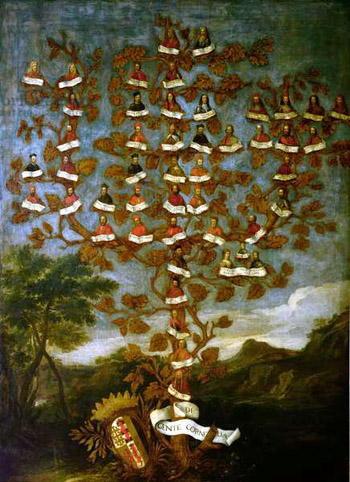 Second, he demonstrates how the stem family amplified and constituted the tribe. The tribe – not understood with the pejorative connotation
the word has in common language – would be a very extended family.
Second, he demonstrates how the stem family amplified and constituted the tribe. The tribe – not understood with the pejorative connotation
the word has in common language – would be a very extended family.
Then, in a third development, these tribes became more numerous, and this larger population were united. The more sedentary people settled together in small territories. In turn, those thorps, or hamlets, attracted those who had become discontent with their former habitations, not excluding some political refugees or even common criminals.
At times those immigrants would enter those hamlets with their own families and mix with the local population, making a social fabric where it was difficult to distinguish who was related or not. But an atmosphere of kinfolk and intense family solidarity reigned in that social homogenous unity, which was the terminal point of the previous evolution.
This homogenous unity formed the municipality, which was constituted by a small urban nucleus and a population spread out in the surrounding countryside with families that had their own houses and farmed their own lands. Together this constituted the municipality.
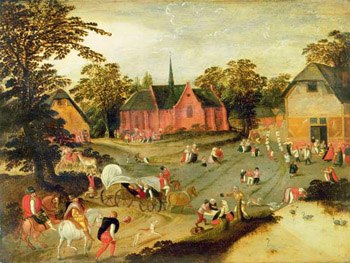 Msgr. Delassus goes on to analyze with greater acumen a point also stressed by Fustel de Coulanges in his book The Ancient City.
Msgr. Delassus goes on to analyze with greater acumen a point also stressed by Fustel de Coulanges in his book The Ancient City.
Since those villages were essentially composed of extended families, the immigrants who entered and were incorporated into them were not elements that broke the family unity, but rather they were inserted into the unity of that initial family group. In that whole social unit, there was a harmony of mentality, a particular way of being, a certain temperament and affection that was proper to the original family, still without suffering the deformations of the great cities that came later.
To understand this well, we should imagine a family today that is very united – as far as this still exists. The family transmits doctrine by communicating stories of what happened in its past and were transmitted from one generation to another in an oral tradition. They are principles of living wisdom – non-abstract teachings – that live in the typical family stories one tells to another: “Now, this is what happened to your grandfather. Once he was doing so and so…” These commonplace facts are true parables that transmit a non-explicit doctrine that is implicit in those examples.
This unity of the ensemble formed a strong internal affinity with an intense affection.
Family affection, the essential element of union
Msgr. Delassus says that this sentiment of affection should be the element of union of a whole country, of a State. When this affection disappears, the State ceases to exist. I believe that this is true. It is necessary for this kind of affection to exist for the State to be a State. Either the State is an enormous family or it dies.
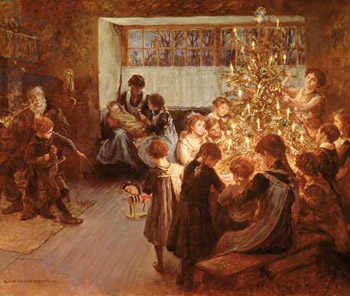 By this definition, we see that for the State to be truly alive, it cannot be so large that this sentiment of family disappears. Msgr. Delassus applies to it the word of Our Lord: “Every city or house divided against itself shall not stand” (Mt 12:25)
By this definition, we see that for the State to be truly alive, it cannot be so large that this sentiment of family disappears. Msgr. Delassus applies to it the word of Our Lord: “Every city or house divided against itself shall not stand” (Mt 12:25)
The cities at the time of Our Lord were city-states like Troy, Sparta and Athens, which acted as kingdoms. So then, every State divided against itself shall perish. Msgr. Delassus says that for a State to not perish, it must have more than the unity given by the Constitution, the army or the mutual interests of the provinces – these are indispensable elements for the union of the State, but none of them is the essential element. The vital element is this family affection and familial nature of the State. When the State lacks this, it can have all the rest, but it is ready to be divided against itself.
He makes the interesting point that in the old States everything was made to consistently increase the union among their parts. On the other hand, in the modern States everything is made to emphasize what divides them. The fact that the modern democracies are established on political parties means that they are based on different approaches to reality that lead to quarrels.
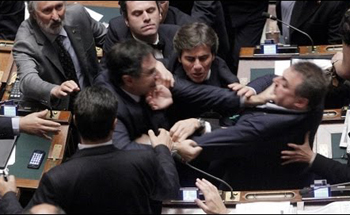 This is so evident that it is difficult for a person to deny it. Msgr. Delassus observes that the representative system based on opposing political parties where one representative stands up before Congress to attack the other party because they think differently is a way to build a union based upon that which divides. This has to lead to disaster.
This is so evident that it is difficult for a person to deny it. Msgr. Delassus observes that the representative system based on opposing political parties where one representative stands up before Congress to attack the other party because they think differently is a way to build a union based upon that which divides. This has to lead to disaster.
On the contrary, the old States looked for what united them. Thus, those marriages of feudal lords with different noble families were meant to unite the regions, to keep the country leagued together around many factors that perpetuated this family sentiment. Deep down, patriotism is nothing but this family sentiment living in the common love of those who have the same motherland.
Considering this, which seems to me a brilliant and jubilant description of reality, we understand that this family sentiment runs the risk of fading away if the boundaries become too extensive. The sense of the family naturally seeks to maintain boundaries proportional to its capacity to fill them. The zone it can cover has to be proportional to the ardor of this familial/patriotic love.
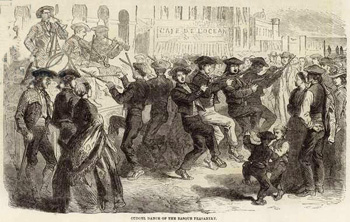 The very notion of zone, which is very difficult to define, can be understood here in psychological terms rather than as a geographical or territorial area.
The very notion of zone, which is very difficult to define, can be understood here in psychological terms rather than as a geographical or territorial area.
Thus, a zone is a certain territory inhabited by a social unit based on familial affection. The boundaries of the zone is what the common love of those who live there is capable of encompassing within one and the same whole.
Hence, we have different sizes of fiefs. In today’s Germany examples of this still remain. Some are large, like Bavaria, others are minuscule independent States like Saarland or Hamburg that are as small as some Brazilian municipalities of São Paulo like Bragança or Marília, or small States in the United States like Vermont or Rhode Island. These zones are often delimited by the intensity of the affection of their inhabitants.
Continued

Posted February 11, 2019

The large extended Italian Cornaro family tree, c. 18th century
Then, in a third development, these tribes became more numerous, and this larger population were united. The more sedentary people settled together in small territories. In turn, those thorps, or hamlets, attracted those who had become discontent with their former habitations, not excluding some political refugees or even common criminals.
At times those immigrants would enter those hamlets with their own families and mix with the local population, making a social fabric where it was difficult to distinguish who was related or not. But an atmosphere of kinfolk and intense family solidarity reigned in that social homogenous unity, which was the terminal point of the previous evolution.
This homogenous unity formed the municipality, which was constituted by a small urban nucleus and a population spread out in the surrounding countryside with families that had their own houses and farmed their own lands. Together this constituted the municipality.

A familial atmosphere in a Netherlands village
Since those villages were essentially composed of extended families, the immigrants who entered and were incorporated into them were not elements that broke the family unity, but rather they were inserted into the unity of that initial family group. In that whole social unit, there was a harmony of mentality, a particular way of being, a certain temperament and affection that was proper to the original family, still without suffering the deformations of the great cities that came later.
To understand this well, we should imagine a family today that is very united – as far as this still exists. The family transmits doctrine by communicating stories of what happened in its past and were transmitted from one generation to another in an oral tradition. They are principles of living wisdom – non-abstract teachings – that live in the typical family stories one tells to another: “Now, this is what happened to your grandfather. Once he was doing so and so…” These commonplace facts are true parables that transmit a non-explicit doctrine that is implicit in those examples.
This unity of the ensemble formed a strong internal affinity with an intense affection.
Family affection, the essential element of union
Msgr. Delassus says that this sentiment of affection should be the element of union of a whole country, of a State. When this affection disappears, the State ceases to exist. I believe that this is true. It is necessary for this kind of affection to exist for the State to be a State. Either the State is an enormous family or it dies.

A family illustrating a warm affection gathers at Christmas eve
The cities at the time of Our Lord were city-states like Troy, Sparta and Athens, which acted as kingdoms. So then, every State divided against itself shall perish. Msgr. Delassus says that for a State to not perish, it must have more than the unity given by the Constitution, the army or the mutual interests of the provinces – these are indispensable elements for the union of the State, but none of them is the essential element. The vital element is this family affection and familial nature of the State. When the State lacks this, it can have all the rest, but it is ready to be divided against itself.
He makes the interesting point that in the old States everything was made to consistently increase the union among their parts. On the other hand, in the modern States everything is made to emphasize what divides them. The fact that the modern democracies are established on political parties means that they are based on different approaches to reality that lead to quarrels.

An intense debate sparks a brawl between MPs in the Italian Parliament
On the contrary, the old States looked for what united them. Thus, those marriages of feudal lords with different noble families were meant to unite the regions, to keep the country leagued together around many factors that perpetuated this family sentiment. Deep down, patriotism is nothing but this family sentiment living in the common love of those who have the same motherland.
Considering this, which seems to me a brilliant and jubilant description of reality, we understand that this family sentiment runs the risk of fading away if the boundaries become too extensive. The sense of the family naturally seeks to maintain boundaries proportional to its capacity to fill them. The zone it can cover has to be proportional to the ardor of this familial/patriotic love.

The peasant cudgel dance illustrates the warm affection of a Basque city
Thus, a zone is a certain territory inhabited by a social unit based on familial affection. The boundaries of the zone is what the common love of those who live there is capable of encompassing within one and the same whole.
Hence, we have different sizes of fiefs. In today’s Germany examples of this still remain. Some are large, like Bavaria, others are minuscule independent States like Saarland or Hamburg that are as small as some Brazilian municipalities of São Paulo like Bragança or Marília, or small States in the United States like Vermont or Rhode Island. These zones are often delimited by the intensity of the affection of their inhabitants.
Continued

Posted February 11, 2019
Organic Society was a theme dear to the late Prof. Plinio Corrêa de Oliveira. He addressed this topic on countless occasions during his life - at times in lectures for the formation of his disciples, at times in meetings with friends who gathered to study the social aspects and history of Christendom, at times just in passing.
Prof. Plinio
Atila S. Guimarães selected excerpts of these lectures and conversations from the transcripts of tapes and his own personal notes. He translated and adapted them into articles for the TIA website. In these texts fidelity to the original ideas and words is kept as much as possible.






